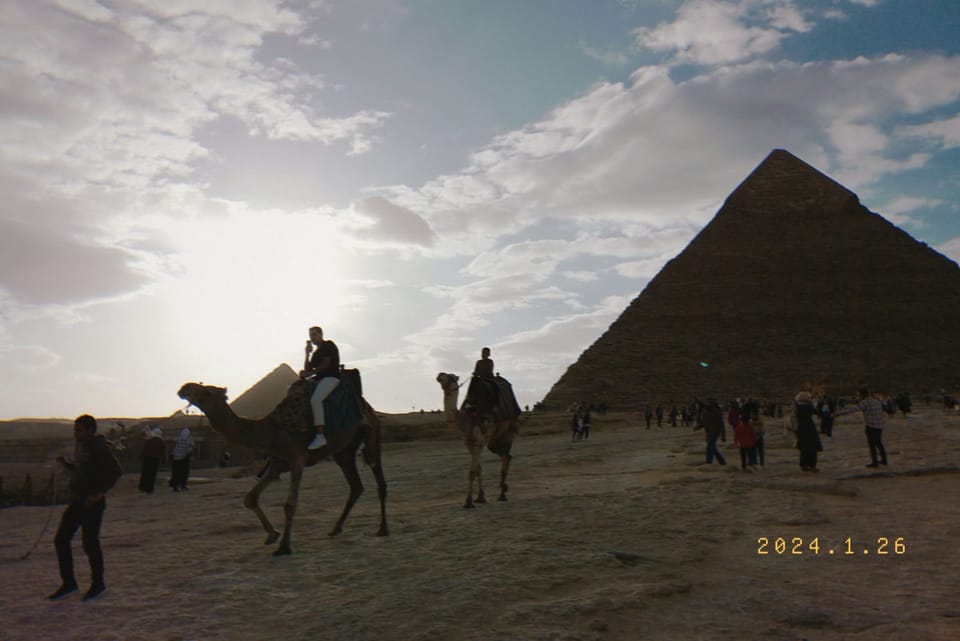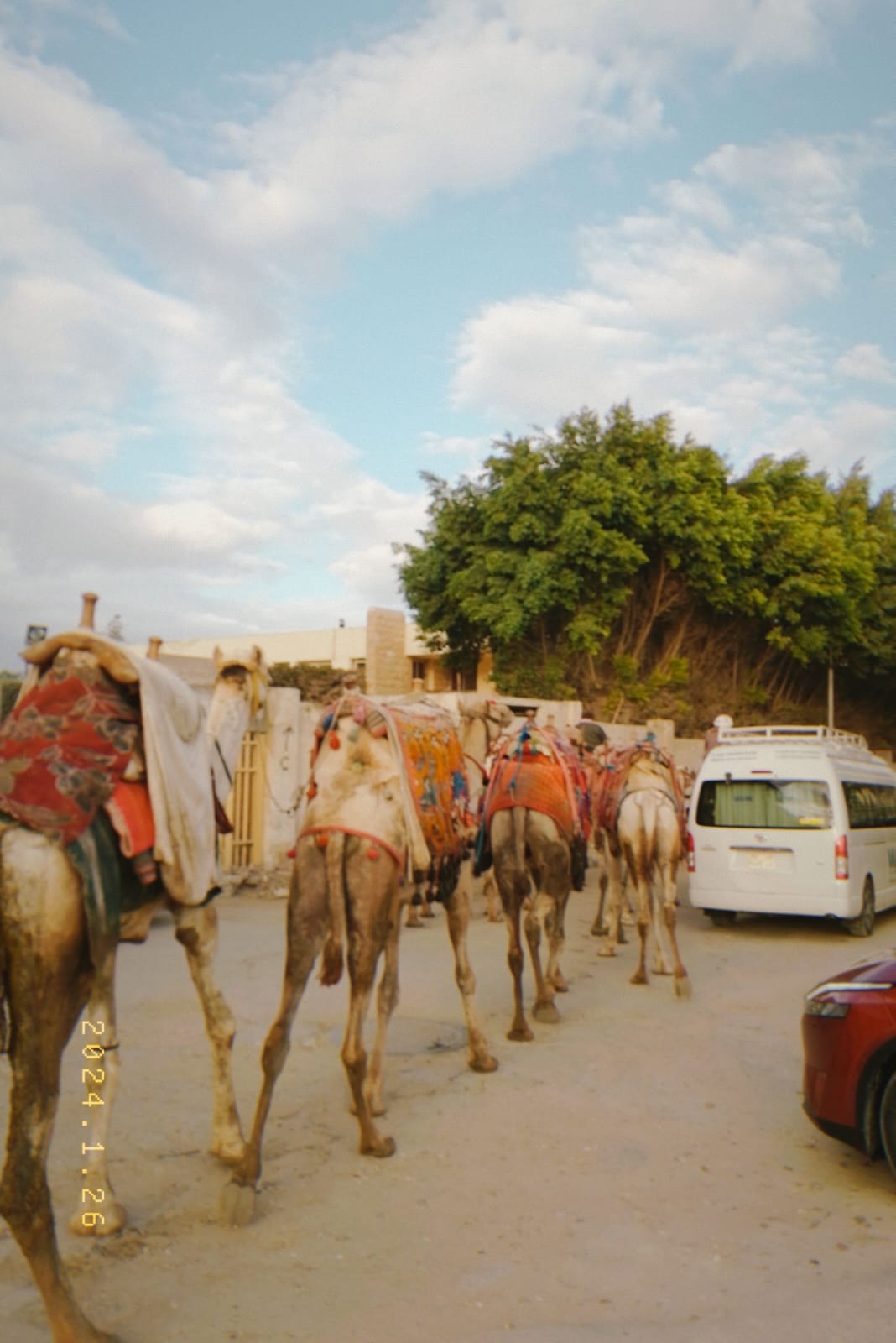Egypt Episode 5 - The Scam Chronicles: A Tale of Trickery

Hey There,
Welcome to the 5th installment of my Egyptian odyssey! 😄 If you've found the journey monotonous, prepare for a change of pace. We're diving into the most thrilling part of my trip - my personal scam anthology! 😲 Despite my experience with multiple solo trips, I was not immune to the advanced scams in Egypt. Amid the grandeur of the pyramids and the tranquility of the Nile, I encountered various scammy situations. 🐪💸 So, buckle up, grab a snack, and let's explore my scam-filled experiences!
"The Camel Conundrum" 🐪
Our first tale of trickery features a camel rider near the Giza Pyramid, a veritable Houdini of the dunes. This guy, masquerading as an official, put on such a convincing show that I found myself believing I’d signed up for a two-for-one camel deal. 🤨 Oddly, the two camels were mine and his! So, without my knowledge or approval, he managed to double the agreed price - talk about a desert discount I never asked for! 😡 I kicked up a fuss, and we had a standoff worthy of a spaghetti western. Luckily, he realised that arguing with me was eating into his scamming schedule, so he rode off into the desert sunset, settling for an extra 100 EGP instead of the 300 EGP he'd hoped for his camel.

"The Cruise Switcheroo" 🚢
Next on our list is a Nile cruise adventure. During my journey from Aswan to Luxor, a seller introduced me to a sleek, modern cruise for the agreed price. Just as I was getting comfortable with the glossy amenities, I was informed the next day that the new cruise had sailed away, leaving me with another cruise - one that appeared to be at least 15 years older. 😳 A classic case of bait-and-switch, Egyptian style!
"The Currency Caper" 💱
Moreover, let's touch briefly on the currency conundrum, a topic we explored in episode 3. In Egypt, various exchange rates exist, with the "official" rate being significantly more expensive than the black market rate. This discrepancy was further exploited when I exchanged currency at hostels. To provide some context, the Google exchange rate sits at 30, while some offers go up to 35 or more. The black-market exchange rate? A whopping 1 USD equals 72 EGP! 😱
Here are some of my personal tips learning from the mistakes
- 📝 Always ask for an official receipt. It's like a treasure map to the real price, not the "once-in-a-lifetime" deal they're claiming it to be.
- 💸 Tipping is as essential as sunscreen in Egypt. Be ready to make it rain (within reasonable limits, of course).
- 📚 Do your homework. Find out the average cost of activities. The price for a camel ride isn’t as high as the pyramids - it should be around 200-300 EGP. A one-night cruise? That’s a 60-80 USD voyage.
- 🎥 Consider becoming a filmmaker. Record your deal negotiations. They'll charge something extra anyway, but at least you'll have evidence for your blockbuster scam documentary.
- 💰 If you aren't sure about the price, let them make the first move. The actual price is usually a neat magic trick, disappearing to around 25%-30% of their initial number. Make your counter-offer around 15%-20% of their price.
- 🖊️ Ever thought a pen might be mightier than a wallet? Offering an extra pen might help. Why? No idea, but it might write you a better deal.
- 📋 Ask for an inventory of what's included in any service. Basic amenities like food, transportation, or tickets are often conveniently 'forgotten'. Ensure they're not playing hide and seek.
- 📱 If you're making deals over WhatsApp, ask them to confirm every. single. item. It's like playing "I spy," but with your holiday expenses.
- 🗂️ Brush up on your complaint filing skills with their local tourism management. Ask for a receipt with their license number. It might be a hassle, but hey, you need to know there's a referee in this bargaining game.
The Surprising Prevalence of Scams in the Travel Industry: A Historical Perspective 📜
Scams in the travel industry are prevalent, even extending beyond Egypt. For instance, tracing back to the Qing Dynasty in China, travel agencies earned a notorious reputation, there was even a saying back then called "Even if the carriers, boatmen, and shopkeepers are not guilty, they should be killed for their bad behaviour." (車船店腳牙 無罪也該殺) 😨
There were multiple examples of scams happening - Porters in ancient, known as 腳夫, would demand high prices before a deal and steal afterwards. They had numerous methods for deception, such as switching out goods. 💼🔄
Boat operators also participated in scams. Some would pretend not to know each other and, once on the boat, coax passengers into gambling, only stopping when they've cleaned them out. Some even pretended to be official police officers, causing passengers to panic and run, leaving their property behind. Lazy and gluttonous boat owners might as well sell the goods entrusted to them by guests. If they encountered any loss, they would intentionally wreck the boat, move the goods haphazardly, and claim they all floated away. 🛥️💰
The Great Tourism Swindle: A Tale of Prisoner's Dilemma 🎲
You might be wondering, why is scamming so prevalent in the travel industry? Well, let's dive a bit deeper and look at it from an economic perspective. Imagine it as a game of 'Prisoner's Dilemma'. The players? They're aiming for the jackpot! In a one-time transaction, like with tourists, the immediate profits gained from scamming may seem more enticing than playing fair. Now, doesn't that add a new layer of intrigue to our scam stories? 💭🎯
But here's the catch - this can damage their reputation, scare off potential tourists, and eventually hurt the industry's overall profits. It's a social dilemma where what seems smart for individuals is actually a bad move for the group. 🤔
So how do we level the playing field? Government regulation is one way - impose heavy fines for cheating and suddenly, playing fair looks more appealing. Industry associations can also step in with a clear code of ethics, and offer platforms for handling complaints. This builds trust and maybe even attracts repeat business. 🏛️📚
Don't forget the power of online reviews. One bad review can hit a travel agency hard, upping the cost of scamming big time. 💻📝
These changes turn this one-off game into a series of interactions where reputation matters. In this setup, playing fair can become the winning move, bringing benefits for everyone involved. Pretty cool, huh? 🔄🏆
"The Last Laugh" 😂
Well, there you have it, folks! My thrilling Egyptian scam saga. As they say, what happens in Egypt, stays in... well, no, I guess it ends up in a blog post for all to see! So, remember, whether you're navigating the dunes of Giza or cruising down the Nile, keep your wits about you, and maybe you can avoid starring in your own scam anthology. Safe travels, scam-busters!
Things that I found interesting this week:
【開羅】進入金字塔內部探險!到金字塔景區怎麼樣不被坑?!原來法老的詛咒真的存在!!!Egypt Giza Pyramid English Sub! (youtube.com)

Member discussion